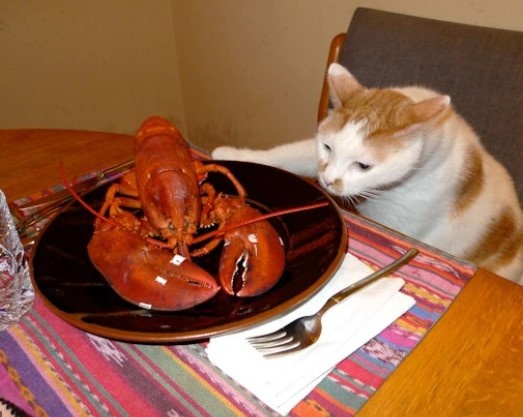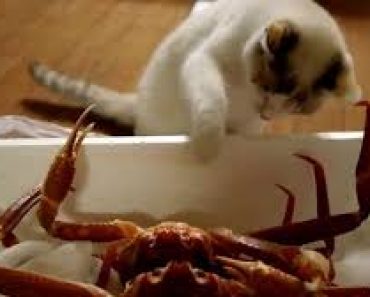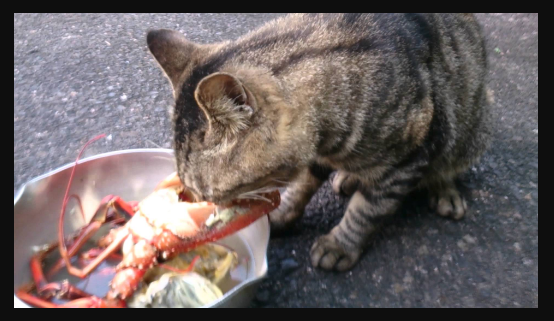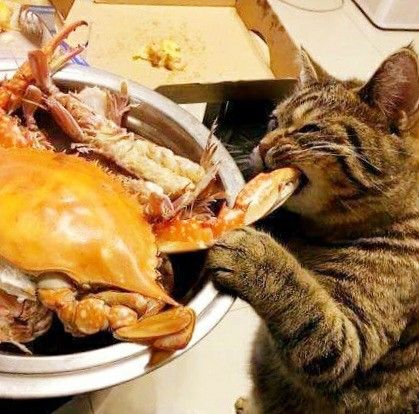Seafood contains very important nutrients for your body and the crab provides your body with certain nutrients that are very hard to find in other foods. Crab is quite a delicious treat, but can cats eat crab?
The short answer is yes, but in moderation. Cats are obligate carnivores which means they rely on animal meat for their survival and feeding your feline friend with crab meat as a treat will not be harmful. Crabmeat is loaded with lots of nutrients which can be very beneficial to your cat. However, it’s advisable to feed your cat cooked crab meat instead of raw as it might contain microbes that can make your cat sick. Before you introduce a new food to your cat’s diet, first consult a vet.
Crab’s nutritional value–Is it OK for cats to eat crab?

Although there’s not a lot of information about the role that crab meat plays in your cat’s nutrition, the nutritional composition of the crab may provide your cat with some key nutrients. Crab flesh can make a very nutritious treat for your cat because cats are obligate carnivores that get their nutritional needs from eating animal flesh.
Crab is known to be extremely rich in proteins, omega 3 fatty acids, vitamins, and minerals which makes it very healthy for both you and your feline friend. All these nutrients make crab meat to be considered to be the healthiest meat available. Crab is also rich in vitamin D which acts as a steroid hormone and it also protects your heart and cardiovascular health. It also cleans your blood vessels which reduces your risk of getting a stroke. The omega 3 fatty acids are also important in brain development and also helps to prevent depression.
Crabmeat doesn’t contain carbs which makes it a good choice for maintaining your cat’s muscles, fur, and claws as it contains lean proteins. Cats use proteins for the same things that your body does and the amino acids in proteins serve as raw materials for your cat’s body structure, heart, muscles, fur, and claws. If your cat doesn’t consume enough protein it can lead to skin infections like eczema, itching, and dandruff. Their hair may also start to fall off, be depressed, and have low energy.
Crabmeat also contains vitamin B12 that isn’t cats can’t easily find in nature. It’s important in maintaining the health of your cat’s immunity, digestive, and brain. When your cat has a deficiency in this B vitamin, she becomes lethargic because her peripheral nervous system isn’t working properly. This can lead to vomiting or diarrhea and a low white and red blood cells count.
Possible side effects–Is seafood bad for cats?

Just like humans, your cat can be allergic to crab and other kinds of seafood. So if you notice your cat has vomiting, diarrhea, rashes on her skin, itching, stomach upsets, among other symptoms, after eating crab meat, these may be as a result of an allergic reaction. Make sure you take your cat to be the vet for medical attention. Like most kinds of seafood, crabs contain high levels of sodium, and cats can’t handle such high amounts of salt in their system.
Eating too much sodium can be a problem for your cat as it can lead to liver, heart, or kidney diseases. It can also develop salt poisoning or hypernatremia. Some of the symptoms of hypernatremia include stumbling, changes in behavior, confusion, seizures, coma, and death. Fresh and unsalted crab meat is the best choice for your cat. This will ensure that there is no excessive fluid buildup in her body and reduce blood pressure.
Heavy metals like cadmium may be present in crab meat in high concentrations and if your cat is sensitive to certain metals it could lead to heavy metal poisoning. So it’s best to limit the amount of crab meat you feed your feline friend.
Is crab meat raw or cooked?

Cats are carnivorous so they usually consume raw flesh so they can also eat raw crab. However, most sea animals may harbor parasites and even bacteria and viruses that can harm your cat. For this reason, it’s advisable to cook crab meat before feeding it to your cat, but remember not to put any additives or seasoning that could harm your feline friend. If you buy canned crab, before sharing it with your cat, ensure there are no additives or seasoning. If it has, don’t give it to your cat. Crabmeat is better given as a treat on occasions, but don’t substitute it with the recommended cat diet.
Can cats eat crab shells?
Crab shells are mostly the hardest part of the crab, but they contain vitamin B12 which is good for your cat. However, they can choke your cat to death, so they aren’t recommended, but feeding your cat small pieces will not harm your cat. Some cats don’t like the smell so if yours doesn’t, don’t force her to eat it.
Do cats like crabs?

Crabmeat that is cooked is considered to be the safest for your feline friend. However, feed your cat in moderation because too much crab meat in your cat’s diet isn’t healthy. When it comes to liking, cats tend to be different in what they like. Some cats like the taste of crab meat while others hate it. If your cat likes it, give it as a treat but remember giving too much can lead to food poisoning. Seafood tends to contain high levels of mercury which can affect the health of your cat.
So, can cats eat crab?
Feeding your cat with cooked, shelled crab meat in moderation is the best way to avoid your cat getting sick from food poisoning or choking. Most seafood contains lots of mercury so you don’t want to feed your cat too much crab meat because it might cause mercury poisoning. Giving them as treats once in a while is the best. Crabmeat is low in fat and carbs compared to other meats which is an excellent way of boosting your cat’s vitamin B12 and protein intake. This will help your feline friend to stay fit and healthy for a long time.
